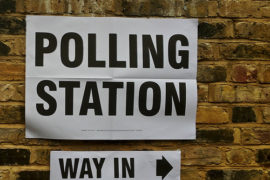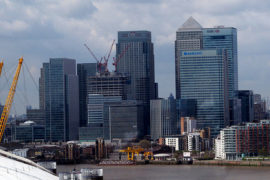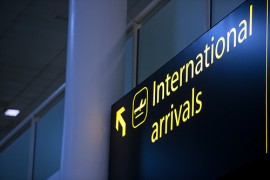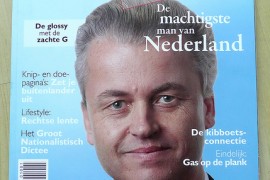Another European election and the BBC are in full cry again trying to find ways of showing that those who support withdrawal are racist. They have form, and it has been tracked in detail by News-watch.
Their justification, of course, is that the party has ‘controversial’ policies that need probing.
The latest story elevated to front page status is that a supporter of withdrawal who is fighting a local council election (not a European parliamentary seat) has made ‘offensive’ tweets against both the black comedian Lenny Henry and Islam.
In the BBC’s lexicon there is perhaps no higher crime.
Conservative minister Jeremy Hunt is enlisted to say so: overt racism, he claims.
The story also includes ‘balancing’ comments from Roger Helmer, the UKIP MEP, who states that the remarks were not party policy, and also that he believed that the way the story was written amounted to an attempt to smear UKIP.
The problem here is not that the BBC has reported the story, or even that they have included the allegations. If a candidate is racist (but, note, there are different sides to the story), then it is legitimate journalism to say so.
The issue rather this is back to the future: the wearily predictable way the BBC always reports the ‘come out’ cause. The important arguments about withdrawal from the EU are totally subsumed by the focus on racism, or some other problem.
The evidence for this is epitomised in a transcript – included fully below because it is so astonishingly negative – from the 2009 European elections. It was broadcast on May 30, 2009, and became the subject of a formal complaint by Lord Pearson of Rannoch which was – of course, as are all complaints about their EU coverage – airily dismissed by the then Today editor Ceri Thomas, who, on a salary of £166,000 a year, has since been promoted and now has a central role in shaping the whole of the BBC’s news coverage.
Most amazing was the 428-word preface by then European editor Mark Mardell, who, with delicious irony, was appointed to the role in 2005 to ensure greater impartiality in the BBC’s reporting of issues such as withdrawal. In three minutes he cobbled together every possible insult against UKIP, without once focusing on its objective of withdrawal; almost gleefully, he heaped against the withdrawal movement the epithet ‘BNP in blazers’ – and claimed MEPs were relentlessly voting against British interests, and were venal.
John Humphrys then kicked off the interview with Nigel Farage with heavy accusations about corruption, followed by…of course, further allegations of racism. This was aggressive interviewing at its most ferocious and gave Mr Farage only minimal space to put points about party policy and withdrawal.
The negative treatment of ‘withdrawal’ in this interview must also be seen in the handling of the topic in the whole election campaign. News-watch surveyed the campaign output across ten flagship news programmes across the BBC output. Among its conclusions were:
· Only six interviews of withdrawal candidates in the whole campaign
· The UKIP “expenses” issue was mentioned in all but one of the interviews, and also in several other reports.
· Aggressive questioning of the party on alleged racism and inefficiency, with a high rate of interruptions
· There were only two brief questions about withdrawal and few opportunities to describe EU-related policies.
Transcript of BBC Radio 4, Today, 30th May 2009, Interview with Nigel Farage, 7.32am
JOHN HUMPHRYS: If we are to believe the opinion poll in The Times this morning, UKIP will get more votes than the Labour Party in the European Election. A result like that would obviously be calamitous for Gordon Brown, but what effect in the long run would it have on UKIP – seen as one of our fringe parties, perhaps? It won a dozen seats at the last European elections, but doesn’t have a single MP at Westminster and, more important still, what effect would it have on our future in the European Union. I’ll be talking to its leader in a moment, but let’s hear first from our Europe Editor, Mark Mardell.
MARK MARDELL: A small sea, more like a pond perhaps, of Union flags drop in front of a diminished group of men in the European Parliament. They thought their election heralded a revolution, but what have they achieved? Not, obviously, their main ambition of getting the UK out of the EU. Most members of the European Parliament regard UKIP as profoundly unserious pranksters with a weird obsession. ‘Criminal betrayal’ – so said UKIP’s rising star Robert Kilroy-Silk MEP, the former Labour MP and daytime TV host, he’s the man with the orange complexion, you’ll remember, before he quite the party. ‘An incompetent joke’ – that’s the verdict of another leadership contender. The pronouncements of sore losers, perhaps, but there’s something of a theme here which real opponents have been quick to pick up on: ‘fruitcakes, loonies, closet racists’ was what David Cameron said about them, and it’s the last bit that annoys the current leadership. Nigel Farage has dismissed the idea that they’re the BNP in blazers, but their main plank in this election is perhaps their opposition to unlimited immigration, and Mr Farage admits he’s spent a lot of time and energy fighting off a take-over by the far right. That must say something about the sympathies of some members. And what about the MEPs? Of the dozen elected, Robert Kilroy-Silk has disappeared from the political scene and two others have been expelled, one jailed for fraud, the other awaiting trial on similar charges. UKIP condemns the EU gravy train, but a good proportion seem to have prominent gravy stains all down their blazers. The European Parliament, for all its bad reputation, is a place where the politicians have a serious job modifying, tweaking, even kicking out proposed new laws. UKIP don’t boast of any achievements on this front, and their opponents say they’ve voted against Britain’s interests in a host of areas from fishing to trade talks. A UKIP news release ruefully admits that occasionally UKIP do miss pieces of legislation. If not the BNP in blazers, then there is something of the golf club militant about UKIP – so old-school they’re in constant danger of being expelled, the boys who didn’t make prefects because they were too ready to cock a snook and put two fingers up at the establishment. But there’s no doubt there is a market for this at the moment, but in a parliament that’s about quiet conciliation not gestures, they make a lot of noise, no one is unaware of their cause. For them the risk is that they become part of an institution they despise, the licensed court jester, who can poke fun at the EU’s po-faced pretentions, as long as they make withdrawal look like a lost cause for mavericks.
JH: Mark Mardell there. Well, Nigel Farage is the leader of UKIP, he’s on the line, good morning to you.
NIGEL FARAGE: Good morning.
JH: Let’s deal with that bit about the gravy train first. You yourself have done rather well out of it haven’t you?
NF: Certainly not. I’ve given up a career in the City of London, I would be earning substantially more money than I am now, but the point is, UKIP MEPs are not in this for a career, they’re not in this for money, they’re in it because they absolutely believe that we’ve got to have a different relationship with the EU, one that is based on . . .
JH: (interrupting) Alright, we’ll come that in a minute, the different relationship with the EU, we’ll come to that in a minute, you say you’re not in it for the money. You have taken, I’m quoting what you said to Denis McShane, the Foreign Press Association asked the other day about your expenses and all that sort of thing, and you said ‘it’s a vast sum, I don’t know what the total amount is, but oh Lord, it must be pushing £2 million’
NF: We don’t get expenses . . .
JH: No, no.
NF: We get set allowances.
JH: Indeed.
NF: It’s an entirely different system to Westminster . . .
JH: (speaking over) Nonetheless, £2 million since you’ve been there?
NF: Well, every single MEP gets the same, you know, Glenys Kinnock gets the same as I’ll get . . .
JH: I know.
NF: And what we have done is we’ve used that money to campaign up and down the country over the last few years, telling people the truth about the EU, and that perhaps is one of the reasons why there’s now a majority of people in Britain who support our view.
JH: Right, so you have used tax payers’ money to peddle the interests of your own party?
NF: No, to peddle the interests of our cause. Last year, the EU . . .
JH: (interrupting) I’m not sure I see the difference.
NF: Last year the European Union spent €2.4 million, sorry billions euros, telling students and schoolchildren that the EU was a wonderful thing. All that UKIP has done is take a little bit of money that’s been given to us and try to counteract some of those arguments.
JH: I don’t know about ‘little bit of money’, most people would consider two million quid in your case quite a lot of money.
NF: We haven’t put it in our pockets, we’ve used it in our campaigns.
JH: Well, you’ve paid your wife to help run your office.
NF: For seven years she helped me on an unpaid basis, since I was leader of a group in the European Parliament and The UK Independence Party, she’s helped me for the last two years.
JH: The question is what effect you’ve had and the answer to that is, apart from the fact that you have used a lot of money, spent quite a lot of money to alert people to what you consider the bad things about Europe, in terms of influencing legislation and the like, you have been entirely ineffective, haven’t you?
NF: Well, I thought Mark Mardell’s report was really grossly unfair. For the first time in thirty years there has been an opposition group in the European Parliament, which has been my privilege to lead over the course of the last five years, we’re seen as the focal point for eurosceptic groups right across the continent, we’ve played a big role in the French referendum, and in the Irish referendum, the day after the ‘no’ vote, the prime minister in Ireland blamed me personally – and my group in the European Parliament – for the ‘no’ result in Ireland. I think that’s pretty effective opposition.
JH: But what you haven’t been doing is sitting there, getting on with the job of being an MEP, and if you run for a post, the post of Member of the European Parliament, surely people who’ve put you into that expect you to . . .
NF: (interrupting) Well I’m sorry, I . . . .
JH: . . . to form the part of a constructive opposition. I mean, the line when you say Mark Madell was unfair, but he’s right about your news release, admitting occasionally you do miss pieces of legislation.
NF: And so does everybody, just remember John that there are days in the European Parliament where we vote on up to a thousand amendments in the space of sixty or seventy minutes. I mean this is . . . the mass of legislation going through is such that nobody from any party could ever tell you they’ve got every single thing right, but I’ll tell you this: unlike the other British parties, we have never voted for any new directive that impacts upon British business, we have opposed it, we have fought hard through parliamentary committees to stop things like the exemption on the 48 Hour Week being removed, we’ve played our full role as MEPs, but what we do not do, we do not support any European legislation, believing that we should make those laws in this country.
JH: The accusation that you are the BNP in blazers . . .
NF: Well, it’s ludicrous.
JH: Because of your . . . well, you are hugely opposed to immigration, any more immigration.
NF: No, we’re not opposed to immigration per se, we believe we should control immigration.
JH: Well, everybody says that.
NF: They do, and they’re not telling the truth, are they? I mean, this has been the problem, the expenses scandal has drowned all of this out. The British public need to know that what’s being done in their name is we’ve signed up to total, unlimited immigration to the whole of Eastern Europe, and the only party that voted against that was UKIP, and we believe in controlling immigration. The only people . . .
JH: (interrupting) But, but, but hang on. You believe in controlling that, a lot of people came in here from Eastern Europe, they did jobs that needed to be doing, now many of them are going back again. What’s wrong with that?
NF: Oh, come on. We’ve still got about 800,000 people net increase from Eastern Europe since those countries joined, and that figure is due to rise. I mean look, a few weeks ago, the President of Romania issued a million passports to people in Moldova. Those people now, if they want, can all come to Britain. Our argument is the British people themselves should decide who comes to live, work and settle in Britain, not the President of Romania.
JH: If you get more MEPs in the European Parliament, if – and it’s a very big if – if you do well in the Westminster elections, I say ‘a very big if’ because you’ve made no impact on the Westminster elections thus far, when will you pull us out, given a chance when would you pull us out? Would you, would you . . . let’s dream for a moment, imagine you were in power, would you pull us out the next day, next week, next month?
NF: The very next day. No question about it. And we would sack ourselves as MEPs and we would then renegotiate a sensible free trade agreement, rather like the one that Switzerland has. This is absolutely vital, it’s a majority view in this country, and I believe it will grow. And what I would really like to see is if UKIP can cause an earthquake next Thursday, if we can really send a loud and clear message to the big party leaders, I would like them to go into the next general election promising us, the British people, the right that we can have a referendum to decide whether we’re part of this Union or not.
JH: Nigel Farage, many thanks.
Photo by theglobalpanorama 










